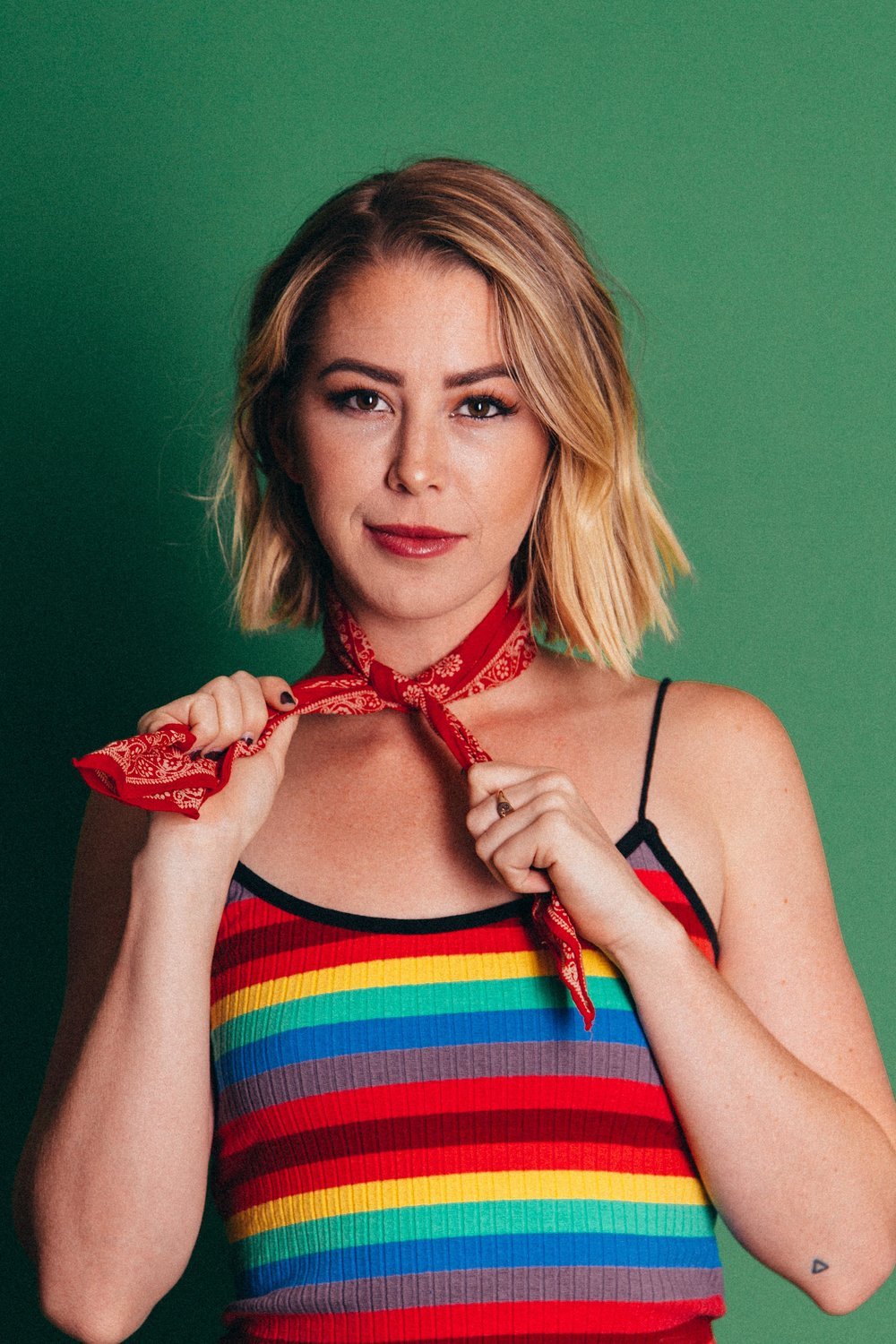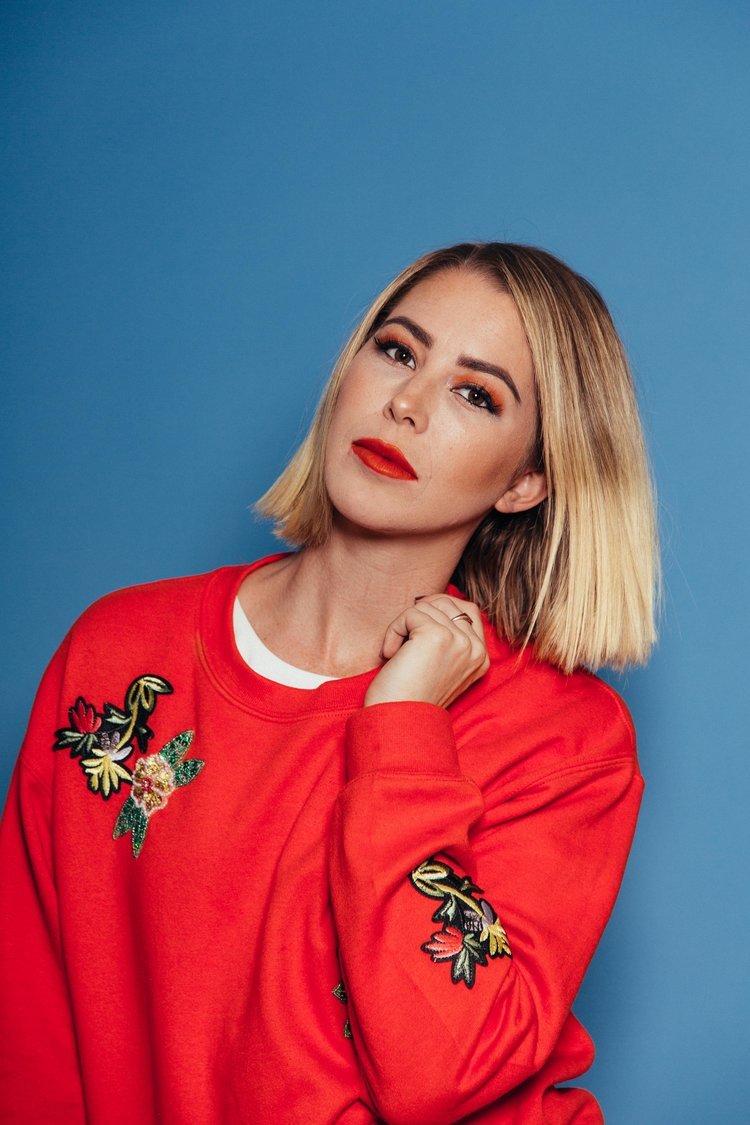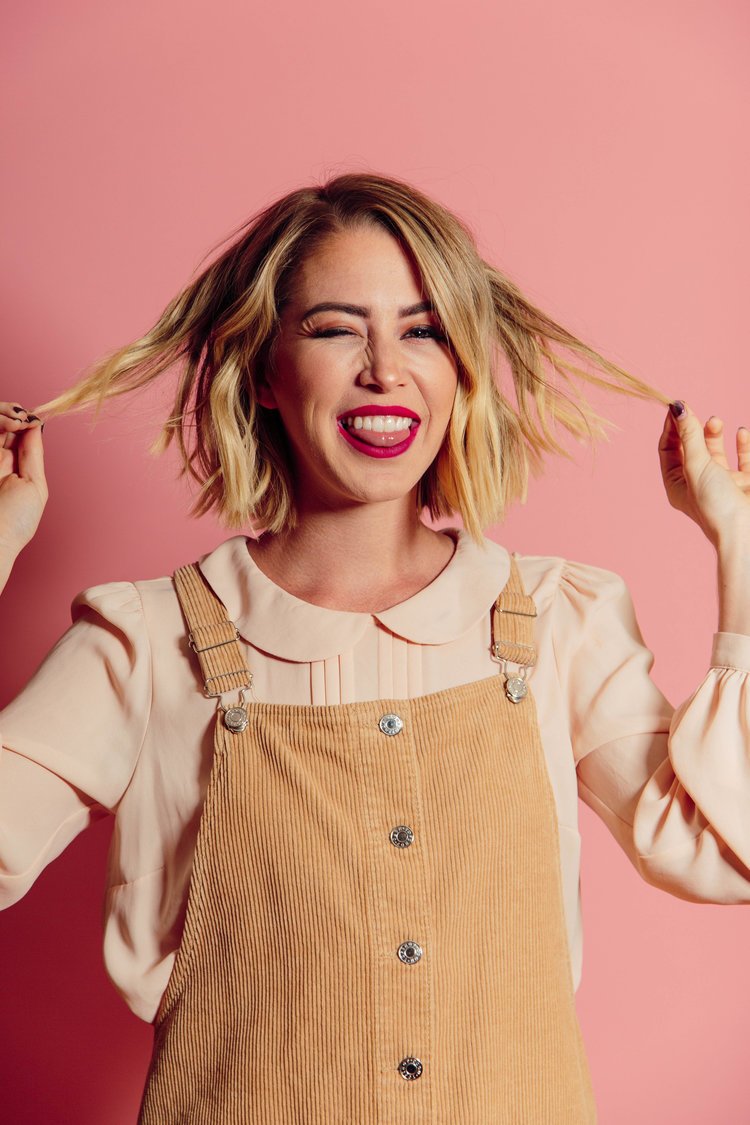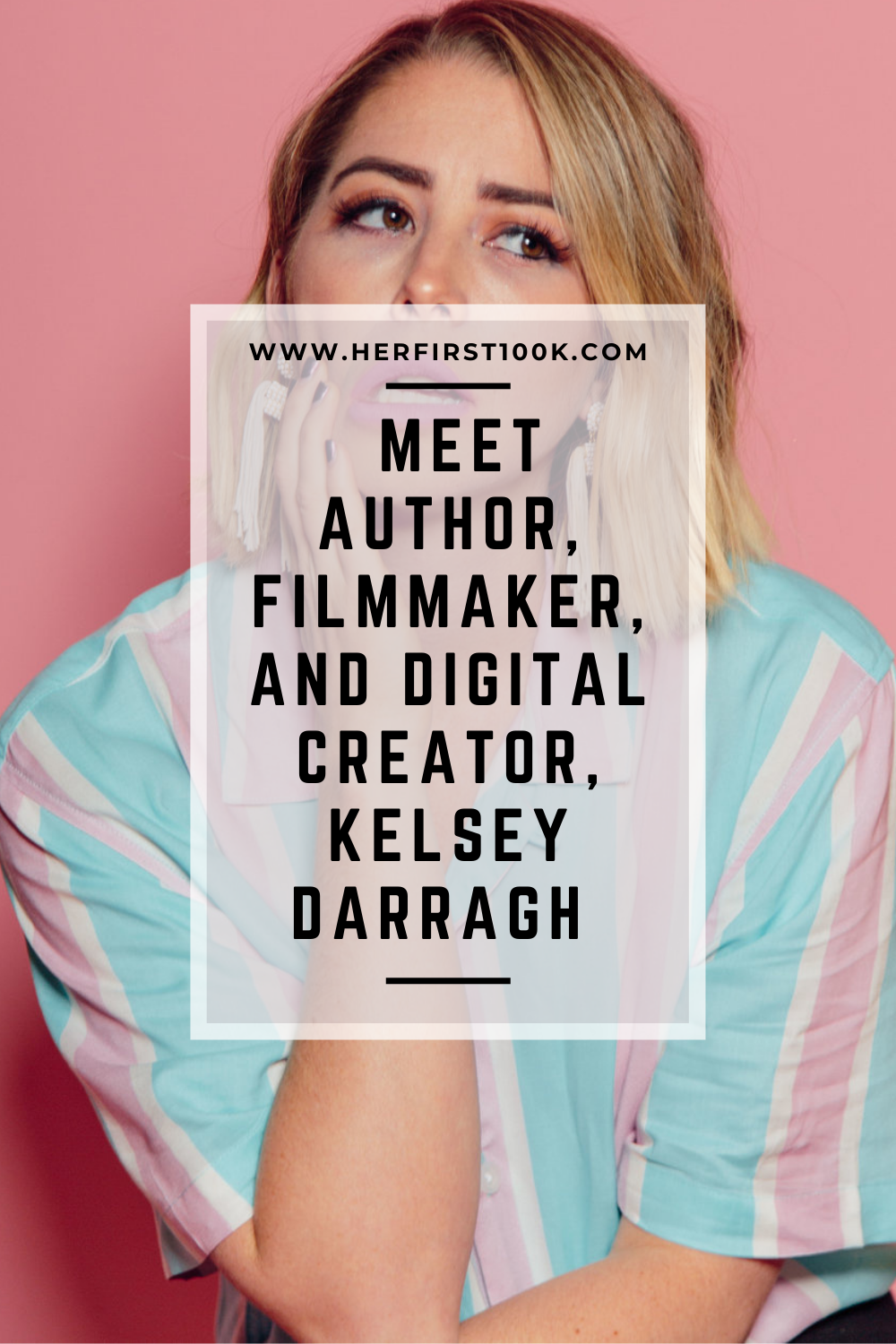The following article may contain affiliate links or sponsored content. This doesn’t cost you anything, and shopping or using our affiliate partners is a way to support our mission. I will never work with a brand or showcase a product that I don’t personally use or believe in.
Multihyphenate creator Kelsey Darragh walks us through her badass journey from viral Buzzfeed Video star (turned development partner) to a millennial household name.
Kelsey Darragh’s name is synonymous with hilarious and viral video content. If you haven’t heard of her (which is unlikely unless you were living under a rock between 2015 and well, now), a quick YouTube search will change that. She’s created a bunch of personal vlogs, comedic sketches, and has two podcasts (more on that later!).
Ever since her first gig as a video intern at Buzzfeed, Kelsey’s made a name for herself in the entertainment industry. Although she didn’t anticipate skyrocketing to internet fame after an internship, she did see herself having a career in media. “I always knew I wanted to be in storytelling, entertainment, and media somehow,” she tells Her First $100K during a Zoom interview. “As a kid, I was involved with musical theater and plays. I did TV journalism in high school and I thought I wanted to go the traditional American dream route by going to college. I got there and I hated it.”
She proceeded to drop out of three schools (Auburn University, New York Film Academy, and L.A. City College). “I think school is such an archaic system,” she adds. “It’s not built for people with creative minds, ADHD, mental health struggles, or financial struggles. I studied screenwriting at my second college in New York. I dropped out of that program, moved to LA, and just decided I was kind of done with waiting for a degree to prove that I could start doing something with my creativity—that ended up working out.”
In the years since she left school, she became a Buzzfeed development partner, wrote a book (and is working on a second), started two podcasts, and founded a sustainable home decor business.
Her First $100K® caught up with Kelsey to chat about all things career, mental health, and what true success really looks like.
The following interview has been edited for length and clarity.
Photo Credit: Jack Dytrych
HFK: How did Buzzfeed happen?
Kelsey Darragh: I was at one of the lowest points in my life. I had gone through a breakup, had gotten out of an inpatient rehab for mental health, and was weaning off of anti-anxiety medication. Meanwhile, I was constantly sending in applications to different media outlets at the time. That’s when YouTube and other media companies were really taking off.
Somehow my application got through to the recruiters. I went in for a meeting and an interview. I thought I completely blew it because I was lying out of my ass about my skillsets in terms of what I could do with the camera. I didn’t know any of the technical terms, but they called me back a few days later and were like, we’d love to have you for the internship program. It was a three to six-month program with an opportunity to extend if I did well. Six months later, I was the boss of the guy who trained me. Then eight months later, I was promoted to a development partner. I really just took it by the balls and made the most of that little inch I was given.
Was there a moment when you realized Buzzfeed was going to be really big?
I didn’t know what to expect because not even I was a huge Buzzfeed follower when I applied. I just knew that it was a media company. I still have screenshots of emails that they would send out to the company when something big would happen or if something got a million views — it was a huge deal. I just remember being like, ‘oh my God, a million views, I can’t believe it.’ It felt really cool to grow with the company and really help shape the identity and impact. That’s what makes that place great. It blew up because the people who worked there made that company what it is. It was the most fun I’d ever had.
That sounds awesome. You have a lot of different projects. What are you working on right now?
At the end of the day, I’m a creator… period. I am a right-brained, Leo sun, Gemini moon and rising, creator. My job is to soak in information and put it out to the world and add a little Leo flair to it. I’ve got a documentary that we’re shooting with LeBron James’ production company. It’s called Justice 4 Suraya. That’s the mental health documentary I started shooting in the pandemic.
I’m working on my second book, which the manuscript is due very soon and I’m not done. I have two podcasts, Confidently Insecure, which Tori has been on and Guilty Pleasures podcast, which I do with Zach [Kornfeld] from The Try Guys and Garrick Bernard from Single Drunk Female.
I’ve got my weekly blogs on my YouTube channel. I’ve got a script in the development phase called Lady Pirates, which is an animated comedy series. I’m gearing up to make my next documentary short this year about a social justice project involving Marlee Liss who was also on the podcast.
On top of all of that, I decided to start a company during the pandemic. I founded a startup that is a sustainable home decor company called Swapskis. We are in the raise and build phase as we speak. I’ve got a team of about four girls, all working sweat equity to make this thing become a reality. I dropped out of three colleges. I literally didn’t know anything about what starting a company looked like in terms of tech, but I feel like I’ve got a pretty good handle on the Kelsey Darragh media side. Then I have these passion projects that kind of pop up out of nowhere.
Photo Credit: Jack Dytrych
That’s impressive! What do you think is the driving force behind everything you do?
I’d say impact. I hate to go back to my Zodiac signs, but Geminis really are curious people and they want to be a conduit for information and change. While working at Buzzfeed, I learned how to get views, numbers, and followers. That’s super cool, but I would hate to rely on that for the rest of my life and have to go to bed with that person who cares only about numbers. Impact on the community has been the most rewarding piece of what I do. If I can help one person get through a panic attack or learn how to build a business, or just laugh that day, then I’ve done my job.
How do you remain healthy when it comes to your mental health while juggling different creative projects?
I remember that it’s a journey — not a destination. For me, it’s about finding the management tools to implement during times when the line doesn’t feel linear. My morning routine is super important to me. I feel off if I don’t do my morning schedule and routine and have time to myself. Getting sober was a huge part of that, too. Two and a half years ago, I got sober from alcohol and that’s been the best thing in the world to happen to my self-care routine.
You have a large Instagram following and have a brand. Is there anything that you think people would be surprised to learn about you?
[Laughs.] It’s funny. As a girl who literally puts out information about her vagina on the internet, I’m like, “What don’t people know about me at this point?” I actually posted a blog like two weeks ago that showed a day in my life. A lot of the comments were like, “I had no idea you were so organized.”
I think I give this kind of like, not necessarily hot mess, but definitely not the most put-together bitch on the internet. I think people are really surprised to see how meticulous I am about my schedule and my content. I’m kind of a neat freak and my house has to be really clean and I love an organized nest as Marie Kondo once said I think.
Yeah, that makes sense. Can you tell me a little bit about the inspiration for your first book and what influenced the one you’re writing now?
My first book, Don’t F*cking Panic, was a little bit of a selfish start. I was really writing the book that I wish I had had when I was 17 and going through the worst mental health bouts of my life. The book is really meant to be carried with you. It’s a workbook. It was really important for me to have exercises, tools, tricks, and tips because when you’re going through those moments, you want to get out of your head.
My second book is going to be in the same kind of format, but the topic is chronic pain. That’s been very hard to write. I thought once you write the first one, the second one’s just so easy. The topic is very tough. I’m going through the thick of that right now.
You mentioned how the first book you wrote would’ve been really helpful for your younger self. Is there any advice you’d give to Kelsey before she just got that internship at Buzzfeed?
Well like I said, getting the job happened right after the worst time in my life. I had a breakup, I was financially struggling, I had just had jaw surgery so my face was literally fucked up – I was not doing well. I say this in the book and it can sound a little dramatic, but it really was something I needed to hear at that age. All you have to do today is stay. If you can do that, then I am proud of you.
Photo Credit: Jack Dytrych
Wow, that’s really powerful. Shifting gears a bit… We focus a lot on money. How have your thoughts about money changed since your twenties?
How long do I have? [Laughs.] I grew up very privileged in that my parents were mid to upper-middle-class and they both had full-time jobs. I was raised by a nanny who’s like my mother, and there was no time to learn about money. If we needed something, it was “pay it away” or just like “put money at the problem.” It sounds nice, except then you get all the emotional trauma that comes with not having the financial tools that I think a lot of us are missing as millennial women.
I’m so excited to be doing this podcast with Tori because it’s actually during a time when I’m learning how to take complete power back over my finances. I had a business manager for the last four years and we just let them go because their prices skyrocketed to $4,000 a month for business management. I was like “No thank you, I will take my coin and go.” So, I am learning all of it right now. Your girl opened a High Yield Savings Account because of Tori.
Yay!!
I am doing QuickBooks. I’m learning invoicing. I never did any of that shit as a business owner. So now I am more aware of the impact that money has on my emotional life because that wasn’t really something I grew up with. That’s been the biggest transformation.
Does your mental health ever affect your spending patterns?
Oh yeah. I mean, I think we literally build neural pathways to feel rewarded when we’re spending money when we’re not feeling good. There are a lot of ways that we can use money to get a quick fix, but we know that it’s not a sustainable long-term solution. So that’s certainly something I’ve had to unlearn as well.
When it comes to your fans, what’s the most impactful or weirdest interaction you’ve had?
The most impactful is anytime someone messages me their story and something I’ve done or created that has helped. If I died tomorrow, I’d be happy. I had people get tattoos of things that I’ve written before, which is crazy to see.
Do you feel like you’ve made it, or do you even subscribe to that belief?
Of course not. I’m a woman in the entertainment industry. I’m never going to be satisfied. I’m never going to feel like I’ve made it. If you look at the surface-level shit, there’s always going to be someone with more money or followers or what looks like a better life than you.
But, if I take away the business aspect of it and I look at myself as a person… Do I feel like I’ve made it? Fuck yeah! I like the person I am and the person I go to bed as. I can live with myself and the choices I’ve made. That’s a big step from who I thought I was like five, ten years ago. I certainly made a lot of growth there. It’s finding that balance of being a confident bitch and feeling like you have done something that makes your life worth living.






